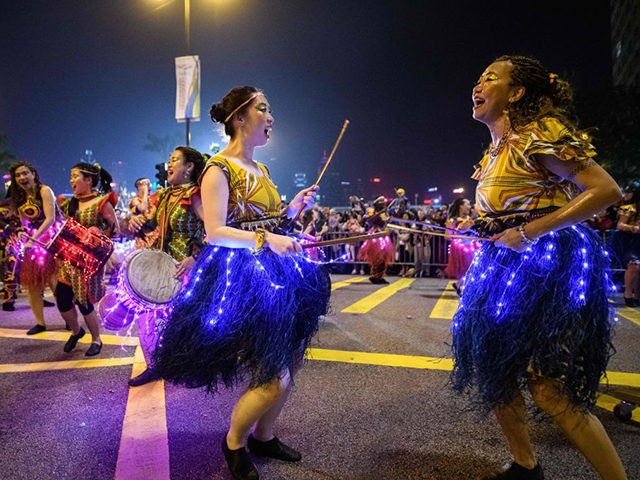Organizers of Hong Kong’s Lunar New Year parade, a major annual event since 1996, announced it will not be held in 2020 because its route through an area that has seen a great deal of protest activity over the past five months is “too risky.” The parade will reportedly be replaced by a carnival, which would be stationary and easy to secure.
Lunar New Year arrives at the end of January, a four-day holiday to be observed between January 25 and 28 in 2020. According to the South China Morning Post on Tuesday, a number of major events have been canceled for the upcoming celebration due to anxiety about ongoing street protests.
“Instead of a street parade, a four-day carnival with a spectacular parade of dazzling performances by local and international performers will be held to celebrate Chinese New Year,” a spokeswoman for the Hong Kong tourism board announced.
Hong Kong also holds events for calendar New Year’s Eve on December 31. According to the tourism board, these events will proceed “on a smaller scale than on previous occasions,” and without some of the live performances usually held on the streets.
“Our new event is better because locals and tourists will have longer to enjoy the event in a safer location, compared with a parade that would last just a few hours,” tourism director Dane Cheng added.
Cheng said Hong Kong currently plans to proceed with its traditional New Year’s Eve fireworks display but may need to reconsider if there is “serious chaos or instability” ahead of the event. He expressed hopes that chaos in the streets might subside after the stunning victory of pro-democracy candidates in last weekend’s elections.
Several officials and industry spokespeople told the South China Morning Post they hoped successful celebrations for both New Year’s Eve and Lunar New Year might help Hong Kong’s damaged tourist industry to begin recovering after months of street battles.
Hong Kong’s economy received a little boost of confidence on Tuesday with news of a successful stock offering by China’s e-commerce giant Alibaba, which plans to use Hong Kong’s stock exchange as a way to eventually give Chinese an opportunity to buy shares in the company. Alibaba originally planned to debut its stock in Hong Kong in 2014 but went to the New York exchange instead after Hong Kong regulators did not approve its plans. Another attempt for a secondary listing in Hong Kong was postponed in August due to the protests.

COMMENTS
Please let us know if you're having issues with commenting.